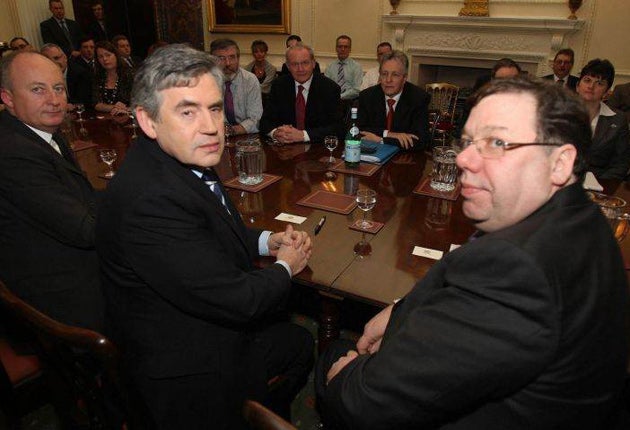The Regions: Northern Ireland
Unionists could emerge as crucial allies for either of the big parties

Your support helps us to tell the story
From reproductive rights to climate change to Big Tech, The Independent is on the ground when the story is developing. Whether it's investigating the financials of Elon Musk's pro-Trump PAC or producing our latest documentary, 'The A Word', which shines a light on the American women fighting for reproductive rights, we know how important it is to parse out the facts from the messaging.
At such a critical moment in US history, we need reporters on the ground. Your donation allows us to keep sending journalists to speak to both sides of the story.
The Independent is trusted by Americans across the entire political spectrum. And unlike many other quality news outlets, we choose not to lock Americans out of our reporting and analysis with paywalls. We believe quality journalism should be available to everyone, paid for by those who can afford it.
Your support makes all the difference.The outcome of the election in Northern Ireland could have an important impact on the peace process, and indeed on the UK as a whole, in the event of a close overall result.
Most attention will be focused on the Democratic Unionist Party (DUP), led by Peter Robinson, whose wayward wife Iris's sexual and financial affairs caused such turmoil in recent months.
The DUP goes into the election holding nine of Northern Ireland's 18 Westminster seats. A good result for the party, for example retaining all or most of these, would give it a bloc which could interest Labour or the Conservatives – should either emerge from the election short of seats to provide a working majority.
Although the DUP has many differences with the British parties, it is a fair bet that it would be prepared to consider approaches from either Labour or the Tories. That has certainly been the case in the past, when Unionist MPs wrung concessions from weak governments headed by James Callaghan and John Major. On both occasions, nationalists protested that British governments were putting their parliamentary needs before providing even-handed administration in Northern Ireland.
The DUP has its troubles, how- ever, having been shaken in recent months by the Iris Robinson saga. With many voters disgruntled by the reports of sexual and financial excesses, at least two DUP seats are at risk. Losing them would put in question the future of Mr Robinson, who as well as being party leader is First Minister in the Assembly. This in turn would destabilise the power-sharing government.
In Mrs Robinson's former seat of Strangford, a DUP candidate will face Mike Nesbitt, a well-known Belfast TV presenter who is standing for the smaller Ulster Unionists, with the support of the Conservative Party. This is probably the UUP's best chance of winning a seat.
The UUP has formed an alliance with the Conservatives, the two parties saying that they will put up candidates in all 18 constituencies, and that they together represent "a new, dynamic political force". This initiative encountered an early setback when the UUP's sole MP, the Labour-leaning Lady Sylvia Hermon, refused to stand on the joint ticket with the Tories.
The DUP's other seat at risk is North Antrim, which was held by the party's founder, the Rev Ian Paisley, for almost four decades. His son, Ian Paisley Junior, will stand, in an attempt to keep alive the Paisley political dynasty. He will face a strong challenge from Jim Allister, a one-time DUP member who is now a forceful critic of sharing power with Sinn Fein and other parties. This will be one of the most spirited contests, since an Allister victory would be seen as a defeat not just for the Paisley family but also for the power-sharing project. A Westminster seat would give a powerful platform to Mr Allister, an articulate QC, to press his campaign against the peace process.
While the Iris Robinson episode turned off many DUP supporters, Westminster elections can exert a powerful tribal pull, with voters overcoming misgivings to cast votes primarily intended to make sure "the other side" does not gain seats.
Sinn Fein, meanwhile, looks likely to hold its five seats, as the party has in recent years steadily pulled away from its moderate nationalist rivals, the Social Democratic and Labour Party (SDLP). In one seat, South Down, a woman SDLP Stormont minister will be facing a challenge from a woman Sinn Fein minister.
Although Northern Ireland is run by a four-party coalition, personalities from each will be pitted against each other in most seats.
There had been speculation that the republicans might lose support due to allegations that Gerry Adams, its president and the MP for West Belfast, had not done enough to expose child abuse within his family.
The general view however is that party support has not been significantly damaged by the episode. Sinn Fein may, however, be anxious that a forthcoming book could contain damaging allegations about Mr Adams' republican past which could put the party on the defensive.
Join our commenting forum
Join thought-provoking conversations, follow other Independent readers and see their replies
Comments